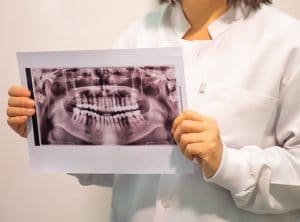What Grinding Your Teeth Together Does to Them
 If you have bruxism, then it may or may not be obvious. You might notice that you grind your teeth a little more often than you used to, but that doesn’t mean you’ll catch yourself doing it often enough to start worrying about it. Unfortunately, having bruxism means that your teeth grind against each other much more often than you realize, potentially even while you sleep at night. Because of this, the condition can cause you to grind your teeth together so forcefully and so frequently that they begin to experience significant complications because of it.
If you have bruxism, then it may or may not be obvious. You might notice that you grind your teeth a little more often than you used to, but that doesn’t mean you’ll catch yourself doing it often enough to start worrying about it. Unfortunately, having bruxism means that your teeth grind against each other much more often than you realize, potentially even while you sleep at night. Because of this, the condition can cause you to grind your teeth together so forcefully and so frequently that they begin to experience significant complications because of it.
It makes your teeth hurt increasingly worse
The grinding of your teeth together is potentially harmful for several reasons. In isolated instances, teeth-grinding isn’t typically anything serious. Yet, when it’s a chronic occurrence, it can become more than your healthy, natural teeth can withstand. One of the first signs that your teeth-grinding is too much is that your teeth will start to grow sensitive due to the constant pressure and friction. You may notice your teeth are most sensitive when you wake up in the morning, especially if you experience nighttime bruxism, or when you apply pressure to them by brushing and flossing.
It gradually wears down their chewing surfaces
The sensitivity that your teeth will start to feel after grinding together long enough is an early indication of the potential damage that it can cause to your teeth’s structures. If it’s left untreated, bruxism can become the source for one or more other oral health concerns, including the wearing down of your teeth’s chewing surfaces. Like sandpaper, the friction of constantly grinding your teeth can smooth out and change areas of your teeth’s chewing surfaces, which alters how your bite works. Your teeth will no longer meet each other evenly when you bite down, and the consequences can become increasingly more severe to other areas of your oral health and bite function.
It can lead to problems with more than just your teeth
Conditions that can arise from chronic teeth-grinding can depend on several different factors, but the more your bruxism remains untreated, the more they can impact more than just your teeth. For example, changes to your teeth’s chewing surfaces, as well as other, more serious forms of tooth damage, can contribute to problems with your jaw’s symmetry and function. This discrepancy, and the continued grinding of your teeth, may cause damage to your jaw’s joints and lead to TMJ disorder.
Learn how to stop grinding your teeth
If you have bruxism and grind your teeth together constantly, you may be doing more harm to them and your overall oral health than you realize. To learn more, call our Cleveland Family Dentistry office in Cleveland, TX, today at (281) 592-1234.



